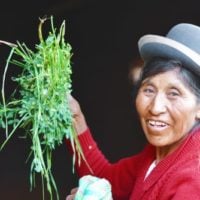Deadline: 10 April 2020
Launched in 2016, the $1M Roddenberry Prize is a global competition to crowd source innovative solutions to issues that demand audacious, far-reaching, and scalable responses.
The Roddenberry Prize seeks to highlight extraordinary organizations and support their efforts towards greater impact; seek out creative approaches from diverse members of global community; and inspire others to take innovative and creative approaches to global problems.
The $1M Roddenberry Prize is a call for big, bold solutions from anyone, anywhere that address the challenges of an unpredictable and fast-changing global landscape.
Issue Areas
- Education
- Education has been and is a pathway out of poverty for countless families regardless of income or geography. Students with even a basic education fare better and have greater opportunities than those who don’t. Schooling improves the overall health of a community, supports economic growth, empowers women and girls, and even combats climate change. Key topics to address in Education include but are certainly not limited to:
- Literacy and numeracy
- Early childhood education
- Access and distance to home
- Affordability
- Technology in the classroom
- Teacher training
- Prize awardees will be working to improve education for all, including better access, teacher training, vocational programs, and tech integration.
- Education has been and is a pathway out of poverty for countless families regardless of income or geography. Students with even a basic education fare better and have greater opportunities than those who don’t. Schooling improves the overall health of a community, supports economic growth, empowers women and girls, and even combats climate change. Key topics to address in Education include but are certainly not limited to:
- Environment
- Global temperatures are climbing, ice caps are melting, and droughts, wildfires, and super hurricanes are tearing their way across the planet. We must protect the oceans, reduce pollution, lower the emission of greenhouse gasses, and mitigate the human destruction of the environment. Key topics to address in Environment include, but are certainly not limited to:
- Climate change: ozone depletion, global warming, greenhouse gases
- Biodiversity
- Plant-based diets
- Deforestation
- Clean Water
- Pollution
- Prize awardees will be working on a range of issues related to the environment, including clean water, pollution, climate change, and the economic and social justice ramifications of environmental policies.
- Global temperatures are climbing, ice caps are melting, and droughts, wildfires, and super hurricanes are tearing their way across the planet. We must protect the oceans, reduce pollution, lower the emission of greenhouse gasses, and mitigate the human destruction of the environment. Key topics to address in Environment include, but are certainly not limited to:
- Science
- Remarkable progress in science, health, and medicine in the past 10 years, has vastly expanded our understanding of the human body, our planet, and the environment. And yet, 1.6 billion people do not have access to basic healthcare. Over 40% of the world is at risk of Dengue fever and nearly 1 million people die of HIV/AIDS every year. Key topics to address in Science include, but are certainly not limited to:
- Malnutrition
- Antimicrobial resistance
- Immunization and global vaccinations
- Health care
- Family planning
- Diabetes
- Prize awardees will be working on a range of health, medical, and scientific advancements, including vaccines, autoimmune diseases, cancer research, and stem cell therapy.
- Remarkable progress in science, health, and medicine in the past 10 years, has vastly expanded our understanding of the human body, our planet, and the environment. And yet, 1.6 billion people do not have access to basic healthcare. Over 40% of the world is at risk of Dengue fever and nearly 1 million people die of HIV/AIDS every year. Key topics to address in Science include, but are certainly not limited to:
- Humanity
- Humanity has made remarkable progress over the past 100 years. Average life expectancy has risen from 50 years to 72. Infant mortality rates have fallen 10-fold; and advances in computing, communications, transport, energy, and agriculture have transformed the ways in which we live, work, and play. Key topics to address in Humanity include, but are certainly not limited to:
- Population growth
- Income inequality and poverty
- Conflict and war
- LGBTQIA rights
- Nationalism and white supremacy
- Online privacy
- Refugees and migration
- Prize awardees will be working on mitigating and solving for the unintended consequences of the vast technological, medical, and scientific advances that have come to define the 21st century.
- Humanity has made remarkable progress over the past 100 years. Average life expectancy has risen from 50 years to 72. Infant mortality rates have fallen 10-fold; and advances in computing, communications, transport, energy, and agriculture have transformed the ways in which we live, work, and play. Key topics to address in Humanity include, but are certainly not limited to:
Prize Information
Four awardees will receive $250,000 each. Awards will be announced in August 2020. The top organizations in each issue area that are not awarded a prize will be recognized publicly as Finalists.
Eligibility Criteria
- The Roddenberry Foundation welcomes Prize applications from individuals, non-profits, social enterprises, and B-corps who meet all of the following:
- Individuals who are 18 years of age or older
- Organizations or institutions with a budget of $10mil or less
- Organizations whose work focuses on Education, Science, the Environment, or Humanity
- Have submitted an application in English
- Complete responses to all required application questions
- Agree to all legal terms and conditions of the Prize grant program
- Be able to legally receive grant funding
- The Roddenberry Foundation sources ideas from all corners of the globe.
Prize Criteria
The Foundation is looking for a well-thought-out plan with clear goals, specific metrics, and measurable impact. They are also looking for solutions that are:
- Innovative: Approaches or strategies that innovate on existing models — What makes this different from and better than other solutions? What are you building on?
- Impactful: Solutions that have potential for outsized, tangible impact — What will you achieve? Will it affect a significant percentage of people?
- Visionary: Solutions that are ambitious in terms of their potential for impact and growth — Is the scope of the vision “big and bold”?
- And where the applicant has a Track Record: Applicant has demonstrated success and achieved tangible impact in a relevant field — Can you point to achieving goals? Do you have a deep understanding of the issues?
For more information, visit https://roddenberryfoundation.org/our-work/roddenberry-prize/







































